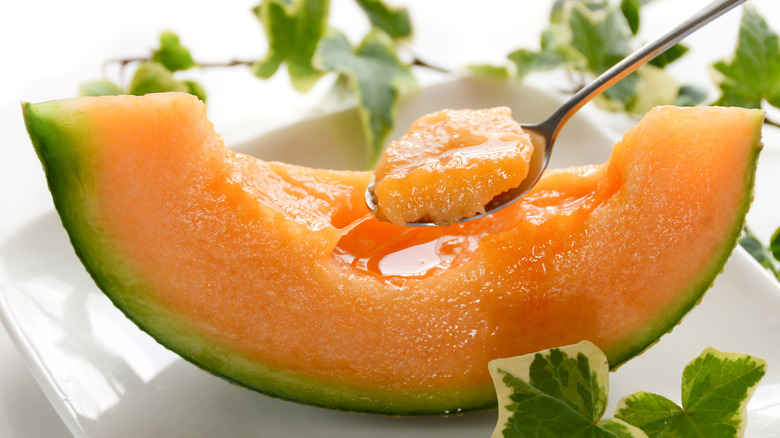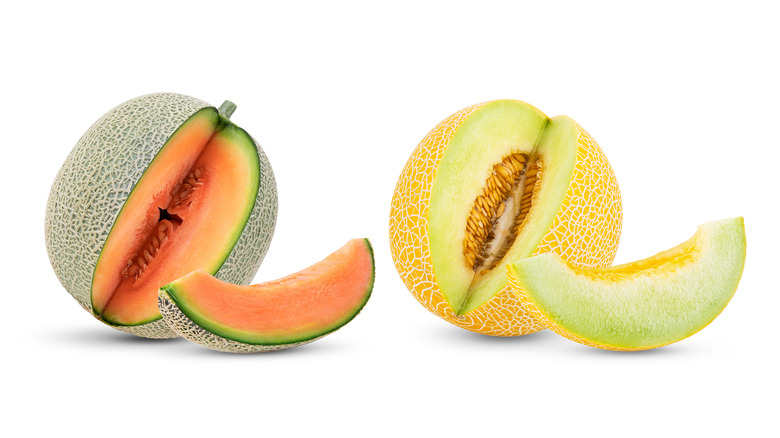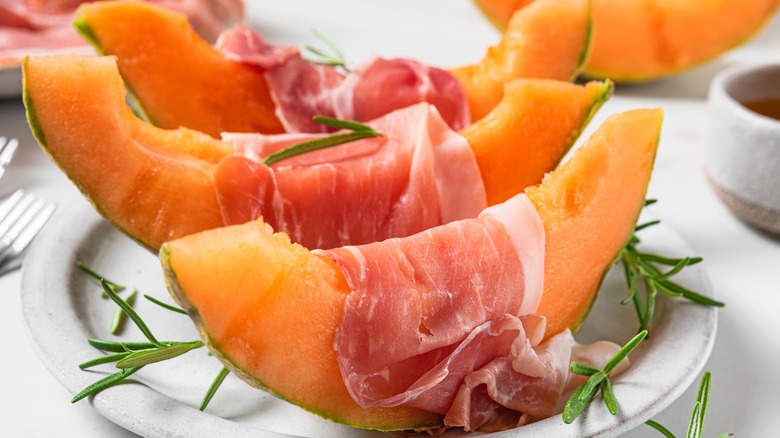What's The Difference Between Cantaloupe And Muskmelon?
Even the best supermarkets rarely have more than three types of melon. That chosen trio is watermelon, honeydew, and cantaloupe, according to Herald-Mail Media. Those three melons are equally delicious and have probably earned their right to virtually monopolize the melon market. But, the world of melons is vast with over 900 different species, according to PlantSnap. Finding those options is tough but if you live in a place with a long enough growing season, Burpee has thirty-three varieties of seeds to plant for your own garden.
According to the Agricultural Marketing Resource Center, Americans eat twenty-five pounds of melon each year. When you want a break from the norm, a market will occasionally have a melon with a net-like skin that sure looks a lot like a cantaloupe but has a more segmented appearance, and is called a muskmelon. Cut into that muskmelon and you'll find a fragrant, orange flesh that, again, sure seems like cantaloupe. But is muskmelon just a clever marketing term for cantaloupe?
Muskmelon is a broad term for many melons
According to Healthline, muskmelon isn't just another name for cantaloupe. It actually refers to a broad range of related melons. This family sprouted from Persia, where musk is a word for perfume, per Aggie Horticulture. The original melons have moved across the world and evolved into that large family that includes cantaloupe and honeydew, among many others.
So, a cantaloupe is a muskmelon. But, muskmelons aren't necessarily cantaloupes. The muskmelon we see in the market is a different melon but very similar to what we refer to as cantaloupe. With that in mind, the melons we see labeled as "muskmelon" are kind of like a display of Honeycrisp apples just labeled "apple." Because these two melons are so similar, the decision for which one to bring home should come down to the one that's most ripe, not the name.
Each will be full of a long list of health benefits, per Mayo Clinic. They're 90% water and full of fiber. That means they fill you up, help you stay hydrated, and keep you feeling that way for a longer stretch of time without a ton of calories. These melons are especially high in vitamins A and C, which strengthen the body's immune system. If that's not enough, the antioxidants in these melons are great for preventing heart disease and can minimize inflation.
Choosing a melon
For all muskmelons, they should be picked when ripe but still firm, according to Herald-Mail Media. By the time you're ready to buy one, the melon should have softened slightly but never be spongy. Make sure the melon isn't cracked or bruised and it should be heavy for its size. Finally, take a sniff to check for the melon's eponymous musk.
Any muskmelon is a welcome addition to fruit salads, of course. But these versatile melons can go beyond the fruit platter. Prosciutto di Parma with Agrodolce Melon is a modern take on a classic hors d'oeuvre. The flesh can be pureed to produce super refreshing frozen treats like Cayenne Cantaloupe sorbet.
Because muskmelons are gourds, like pumpkins and squash, the seeds are edible, according to Healthline. Once roasted, they can be eaten out of hand for a salty snack or added to salads to provide some crunch. The skin, however, is something you do not want to eat.


